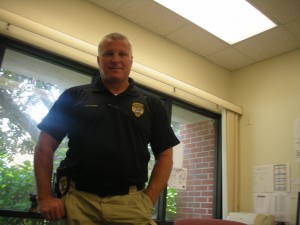April 15th, 2013. That’s the day assured safety and innocence at sporting events evaporated into thin air. On that third Monday in April, known annually as Patriot’s Day in New England, the Boston Marathon bombings reverberated across Boylston Street and stretched across a nation.
Dzhokhar Tsarnaev, the alleged culprit, has been caught. A nation, and one of its’ proudest cities, has shown tremendous resolve. But any attack that pulls off its intended consequences can serve as a lesson, a tool, to help prevent anything of the sort from happening ever again.
As fall approaches, so, too, does another year of football across America. And as football approaches, law enforcement has turned their eyes toward safety at large scale sporting events.
It’s no different at the University of Florida in Gainesville.
“We take every year very serious,” Lt. William Gainey of the University Police Department says. “We have no specific threats, no specific bulletins out with the FBI at this time. However, we treat every season the same.”
Gainey serves as the Deputy Operations Chief for Football Operations. With the title comes the task of mobilizing the extensive security detail responsible for maintaining safety and order at Ben Hill Griffin Stadium on Saturdays.
As the Gators home opener against Toledo on August 31st rapidly approaches, Gainey says the security team has taken special note of the Boston Bombings in regards to their game day surveillance.
“Recently, the big thing [that happened] was the Boston Marathon bombings, with the terrorists placing bombs inside of trash cans,” Gainey says, positioning his hands at rest on his desk. “So obviously, we’ve taken steps moving forward, at all our venues on campus to address that issue.”
Gainey is a professional in the truest sense of the word. His office is well lit, courtesy of the glass panels that make up the far wall. His cropped hair and piercing eyes are textbook traits of an officer of the law. His even-keeled demeanor and calm, steady pacing suggest he’s done this before. It’s certainly not his first interview. He continues.
“I’m not going to get into the specifics on what we’re going to do, but rest assured we are very aware of that tactic so we will have measures in place to combat that.”
~*~*~*~*~
William Gainey refuses to talk specifics. No numbers, no locations. It’s an obvious and understandable strategy to play something as vital as stadium security so close to the vest. He does however, outline some of the procedures of the security team on game days.
“Anybody that walks up to Ben Hill Griffin Stadium on game day is going to see a lot of police officers. A lot of law enforcement officers at the gates checking for prohibited items. They’re looking for any suspicious person, any suspicious item, any suspicious bulge in anyone’s pocket.”
Patrons are subject to being patted down upon entrance to the stadium, and while those doing the checking are garbed in their police uniforms, not every officer is so easy to spot.
“There’s also a lot of law enforcement that you’re not going to see, in plain clothes, that are assigned to different areas of the stadium looking for anything or anyone out of the ordinary. That’s a huge part of our operations.”
Despite the latest terror attack occurring during a open-aired sporting event (though granted, not in a stadium), Gainey doesn’t seem overly concerned about the imminent threat of an attack in Gainesville.
“We have no specific threat, no specific threat bulletin that indicates we’re going to have any type of terrorist activity or incident on our campus. However, with that being said, we want to treat every event on our campus with the highest level of security.”
~*~*~*~*~
The Florida Gators football team opens and closes every season at roughly the same time. The beginning of September, the end of November, usually with a bowl game appearance sometime in December or January. A five-month season, tops. The same can’t be said for the officers responsible for game day security.
“We take game day operations very serious. This is something that we plan for year round,” Gainey adds, contrasting the schedule of the team. “Football season just doesn’t end for us in November. There’s a lot of planning, a lot of other events that go on throughout the year that helps us prepare for the season.”
Preparation for this season has been underway for some time now. In April, the officers held a training exercise which role played a catastrophic event occurring in the stadium. The purpose of the exercise is to test the wits, reaction time, and communication lines amongst the officers.
“You hope that it simulates as much as possible an actual incident, so you can gauge where you’re at. The level of cooperation, communication is a big key between each agency.”
Gainey is quick to comment on, and commend, the strong level of trust between the other departments, which include the Gainesville Police Department and the Alachua County Sherriff’s Office.
“We’re extremely fortunate that we have… “ He starts, before coming up with a more definitive statement. “I don’t know if we can have better cooperation, better communication between all the major law enforcement agencies in this county.”
Though they’re service extends year round, Gainey is ready to make one comparison to the football team he helps protect.
“I guess in a lot of ways…” Here he smiles. “Just like the players, law enforcement is always practicing for gameday. We’re looking forward to it, I think we’re ready, and we’re ready to go. Let’s get it started.”
Count them as one team that’s always ready.

